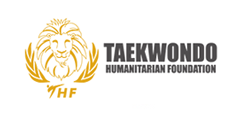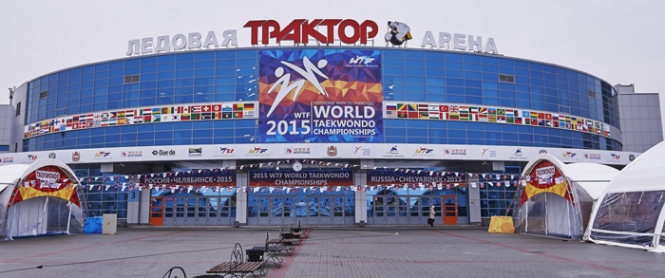CHELYABINSK, Russia (May 12, 2015) – From welcoming mascots at the airport to downtown branding, this central Russian city straddling the Urals and Siberia has rolled out the red carpet for the 2015 World Taekwondo Championships.
In a year when Russia is celebrating the 70th anniversary of the end of World War II, taekwondo branding is as visible in Chelyabinsk’s downtown as are posters featuring heroes, heroines and armaments of the “Great Patriotic War.”
Athletes and officials arriving at Chelyabinsk Airport are greeted by young volunteers in branded tracksuits and costumes representing a Russian bear and a taekwondo lion chorusing “We are pleased to see you!” in English. In the city center, the championship logo is ubiquitous, splashed across banners decorating overpasses and building frontages.
WTF President Chungwon Choue noted that soon after arriving in the city he had been surprised by an unseasonal snowfall, but “… because of the warm welcome by the governor and people of Chelyabinsk I feel very warm – even hot!”
The city’s Traktor Arena – home venue of Chelyabinsk’s Traktor Ice Hockey Team and a venue that has previously hosted international acts including Sting, Limp Bizkit and Cirque de Soleil - is decorated with giant photos of taekwondo athletes in action and a village of colorful tents has sprung up on the forecourt, selling taekwondo merchandise and memorabilia.
On the main road outside the venue, a huge banner features Choue presenting Russian President Vladimir Putin with an honorary taekwondo black belt.
Chelyabinsk has invested significantly in making the event a success. Interpreters are providing translation in seven languages and a fleet of 106 vehicles is on standby to ferry athletes and officials.
But while the seven-day championship promises to be spectacular, the federation’s sojourn in the city started on a somber note. On May 9, in pouring rain, the WTF Council was granted a rare honor: They were given front row positions at the city’s military parade marking “Victory Day” – the anniversary of the end of the war in Europe - by special invitation of Chelyabinsk Governor Boris Dubrovskiy.
“The weather is not very pleasant,” said Choue, draped in a rain coat supplied by the parade organizers. “But this a once-in-a-lifetime opportunity.”
Chelyabinsk earned the nickname “Tankograd” during World War II for its role as an armaments hub, forging weapons including rocket launchers and tanks. These were the iconic armaments the Red Army wielded to shatter Hitler’s legions on the Russian front, which most historians consider the decisive theatre of the war.
Today, a World War II tank looms, poised for battle, on a rampart in the city center – an evocative reminder of Chelyabinsk’s 1941-1945 heritage and the icon of the city.
Chelyabinsk remains a key center for Russian heavy industry, but, located in the very heart of Russia, it is also the perfect location to explore the scenery of the South Urals. This growing tourism sector explains the city’s surprisingly wide range of deluxe hotels, which include a Radisson and a Marriot.
It also has a solid sport heritage. Last year it hosted the World Judo Championships, and two of Russia’s top taekwondo athletes, 2013 World Champion Olga Ivanova and 2012 Olympic bronze medalist Anastasia Baryshnikova, hail from Chelyabinsk.
“We always thought Chelyabinsk was the winter sports capital of Russia,” said Deputy Minister of Sports of the Russian Federation Pavel Novikov at a press conference held on the championships’ opening day. “But now it turns out that it is also the martial arts capital of Russia!”
Inhabitants are stoked: The Traktor Arena is sold out and Chelyabinsk natives are even travelling from other parts of Russia, as well as from abroad, to be home during the championships.
“This is my hometown; I study in America and was not planning to come to this championship, but I changed my plane ticket to come home,” said 19-year-old student Sofya Logunova. “People from the capital are coming to Chelyabinsk for this - people are excited!”



































